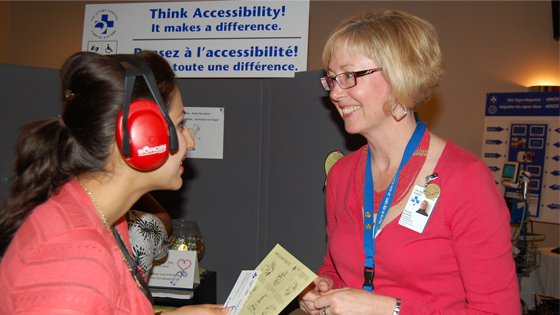
Brenda Morris (right) helps TOH staff members understand what it’s like to live with disabilities, such as hearing loss.
Ever wonder what an accessibility coordinator is, or why TOH has one? The field of accessibility is evolving quickly as public and private organizations put Ontario’s Accessibility for Ontarians with Disabilities Act (AODA) into action. My role is to share information about AODA and develop resources and training to make sure TOH complies with AODA.
Here is what my typical day looks like:
8:30 a.m. I respond to a patient complaint about a lack of chairs with arms in a public space. Patient feedback helps us see where accessibility gaps exist. In this case, we buy appropriate chairs. This patient also decides to join our Virtual Accessibility Advisory Network – an online group that provides advice to the Accessibility Committee.
10 a.m. It’s Corporate Orientation today and I have 40 minutes to get all new hires on the same page about what “disability” means (visible and invisible!), brief them on provincial legislation, and review tips for interacting with people with disabilities. I have to talk fast!
11 a.m. I meet with a Human Resources colleague to discuss employment standards under AODA and share best practices for how TOH will meet those standards.
12:30 p.m. Back to the office to prepare for a training session for accessible-taxi drivers. Our unique training approach is customized for each new audience and often includes simulations of vision loss (using goggles), hearing loss (using earmuffs) and mobility challenges (using wheelchairs).
2 p.m. The Accessibility Committee, which I co-chair, meets to review progress on meeting our accessibility goals and AODA requirements. Several members represent patients and families who live with disabilities and, as usual, these voices inspire us to continue our work to eliminate barriers.
3:30 p.m. Back to the office to check email and speak with Kelly Parent, Accessibility Program Assistant, about a new injury survivor who wants to join TOH’s PARTY program (Prevent Alcohol and Risk-Related Trauma in Youth) as a guest speaker.
The best part of my job is working with so many different colleagues to make changes that increase access and build on TOH’s exceptional service. Ultimately, accessibility is everyone’s responsibility and collaboration is the key. Think Accessibility!

Support patient care and research at
The Ottawa Hospital


 To reset, hold the Ctrl key, then press 0.
To reset, hold the Ctrl key, then press 0.